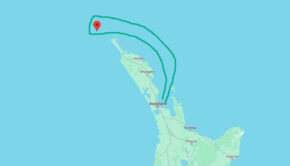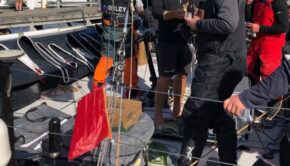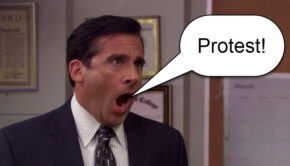Turning point for the rules of sailing
Published on October 29th, 2020
Internationally-acclaimed umpire and jurist Henry Menin offers this tribute to one of the significant contributors to the sport.
Juan “Billo” Torruella was a giant of a man, not only physically, but in the way he lived his life. While his obituary in Scuttlebutt reflects on many of his outstanding accomplishments, his huge influence on the racing community may not be as well known.
As the Chief Judge of the U.S. Court of Appeals, First Circuit, he authored the decision in the Juno v. Endeavor case in 1995. That decision established that when competitors enter a regatta, they enter into a contract to follow the Racing Rules of Sailing, including the protest procedures, and to abide by the decisions of the protest committee.
Because the protest rules provide procedures for, among other things, the conduct of a hearing at which the parties have a right to be present, and may introduce and rebut evidence, examine and cross-examine witnesses and an independent body to hear and make the decision, due process is followed and the decision is final and binding on the parties, thereby debarring a separate action in the civil courts.
Thus was resolved any question about sailors resorting to the courts for relief from incidents on the race course.
Mary Pera, who at that time was the guru and Grande Dame of the Racing Rules of Sailing, and to whom almost everyone looked for advice on the rules, remarked to me that the “Endeavor” case was the most important, necessary, and impactful decision regarding the racing rules.
On a more personal note, Billo was a hero of mine, but not only for all his accomplishments in sailing and other sports and as an International Judge and as an arbitrator and official for the Court of Arbitration for Sport. He was a man of vast experience and great intelligence along with impeccable integrity and a firm sense of fairness. And he was fun. He was a lover of life in a big way, fitting for a man of his physical size and brilliant mind.
He loved food, especially his local Puerto Rican dishes. When working with him on his turf, he took us to the most out of the way, tiny, local restaurants for incredibly delicious meals. He knew everyone, from the owners to the waiters to the dishwashers.
He explained, to our amazement and delight, how the clear plastic bags filled with water that were hanging from the ceilings, by their magnifying effect, scared away the mosquitoes when they saw themselves as they approached the bags.
He played the guitar. He sang traditional songs, mostly in Spanish. He loved to eat and to drink red wine. He was a kind and thoughtful man. He was a true renaissance man and one of a kind.
His presence was imposing, whether in a social setting, in the protest room, or in the court room. But most of all, he loved his wife, Judy, and his kids, and he was a true and wonderful friend. All who knew him will miss him, especially Fredelle and me.









 We’ll keep your information safe.
We’ll keep your information safe.